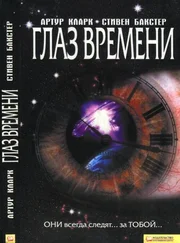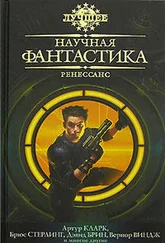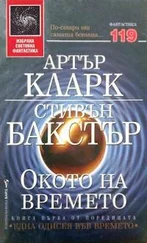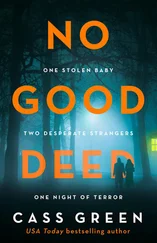Стивен Бакстер - The Good New Stuff
Здесь есть возможность читать онлайн «Стивен Бакстер - The Good New Stuff» весь текст электронной книги совершенно бесплатно (целиком полную версию без сокращений). В некоторых случаях можно слушать аудио, скачать через торрент в формате fb2 и присутствует краткое содержание. Год выпуска: 2002, ISBN: 2002, Издательство: St. Martin's Griffin, Жанр: Фантастика и фэнтези, на английском языке. Описание произведения, (предисловие) а так же отзывы посетителей доступны на портале библиотеки ЛибКат.
- Название:The Good New Stuff
- Автор:
- Издательство:St. Martin's Griffin
- Жанр:
- Год:2002
- ISBN:0-312-26456-9
- Рейтинг книги:3 / 5. Голосов: 1
-
Избранное:Добавить в избранное
- Отзывы:
-
Ваша оценка:
- 60
- 1
- 2
- 3
- 4
- 5
The Good New Stuff: краткое содержание, описание и аннотация
Предлагаем к чтению аннотацию, описание, краткое содержание или предисловие (зависит от того, что написал сам автор книги «The Good New Stuff»). Если вы не нашли необходимую информацию о книге — напишите в комментариях, мы постараемся отыскать её.
The Good New Stuff — читать онлайн бесплатно полную книгу (весь текст) целиком
Ниже представлен текст книги, разбитый по страницам. Система сохранения места последней прочитанной страницы, позволяет с удобством читать онлайн бесплатно книгу «The Good New Stuff», без необходимости каждый раз заново искать на чём Вы остановились. Поставьте закладку, и сможете в любой момент перейти на страницу, на которой закончили чтение.
Интервал:
Закладка:
Harra and Lee stood silently and watched him go.
"You didn't have to be so rough with him," Harra said, but knew it wasn't so. She just hated to see him so confused.
"It's best done quickly when they resist. And he's all right. He'll have a fight with himself, but there's no real doubt of the outcome."
"So the Piri I know will be dead soon?"
Lee put her arm around the younger woman.
"Not at all. It's a reintegration, without a winner or a loser. You'll see." She looked at the tear-streaked face.
"Don't worry. You'll like the older Piri. It won't take him any time at all to realize that he loves you."
He had never been to the reef at night. It was a place of furtive fish, always one step ahead of him as they darted back into their places of concealment. He wondered how long it would be before they ventured out in the long night to come. The sun might not rise for years.
They might never come out. Not realizing the changes in their environment, night fish and day fish would never adjust. Feeding cycles would be disrupted, critical temperatures would go awry, the endless moon and lack of sun would frustrate the internal mechanisms, bred over billions of years, and fish would die. It had to happen.
The ecologists would have quite a job on their hands.
But there was one denizen of the outer reef that would survive for a long time. He would eat anything that moved and quite a few things that didn't, at any time of the day or night. He had no fear, he had no internal clocks dictating to him, no inner pressures to confuse him except the one overriding urge to attack. He would last as long as there was anything alive to eat.
But in what passed for a brain in the white-bottomed torpedo that was the Ghost, a splinter of doubt had lodged. He had no recollection of similar doubts, though there had been some. He was not equipped to remember, only to hunt. So this new thing that swam beside him, and drove his cold brain as near as it could come to the emotion of anger, was a mystery. He tried again and again to attack it, then something would seize him with an emotion he had not felt since he was half a meter long, and fear would drive him away.
Piri swam along beside the faint outline of the shark. There was just enough moonlight for him to see the fish, hovering at the ill-defined limit of his sonic signal. Occasionally, the shape would shudder from head to tail, turn toward him, and grow larger. At these times Piri could see nothing but a gaping jaw. Then it would turn quickly, transfix him with that bottomless pit of an eye, and sweep away.
Piri wished he could laugh at the poor, stupid brute. How could he have feared such a mindless eating machine?
Good-bye, pinbrain.
He turned and stroked lazily toward the shore. He knew the shark would turn and follow him, nosing into the interdicted sphere of his transponder, but the thought did not impress him. He was without fear. How could he be afraid, when he had already been swallowed into the belly of his nightmare? The teeth had closed around him, he had awakened, and remembered. And that was the end of his fear.
Good-bye, tropical paradise. You were fun while you lasted. Now I'm a grownup, and must go off to war.
He didn't relish it. It was a wrench to leave his childhood, though the time had surely been right. Now the responsibilities had descended on him, and he must shoulder them. He thought of Harra.
"Piri," he told himself, "as a teenager, you were just too dumb to live."
Knowing it was the last time, he felt the coolness of the water flowing over his gills. They had served him well, but had no place in his work. There was no place for a fish, and no place for Robinson Crusoe.
Good-bye, gills.
He kicked harder for the shore and came to stand, dripping wet, on the beach. Harra and Lee were there, waiting for him.
George R.R. Martin
THE WAY OF CROSS AND DRAGON
Born in Bayonne, New Jersey, George R.R. Martin made his first sale in 1971, and soon established himself as one of the most popular SF writers of the seventies. He quickly became a mainstay of the Ben Bova Analog with stories such as "With Morning Comes Mistfall," "And Seven Times Never Kill Man," "The Second Kind of Loneliness," "The Storms of Windhaven" (in collaboration with Lisa Tuttle, and later expanded by them into the novel Windhaven), "Override," and others, although he also sold to Amazing, Fantastic, Galaxy, Orbit, and other markets. One of his Analog stories, the striking novella "A Song for Lya," won him his first Hugo Award in 1974.
By the end of the seventies, he had reached the height of his influence as a science fiction writer, and was producing his best work in that category with stories such as the famous "Sandkings," his best-known story, which won both the Nebula and the Hugo in 1980, "The Way of Cross and Dragon," which won a Hugo Award in the same year (making Martin the first author ever to receive two Hugo Awards for fiction in the same year), "Bitterblooms," "The Stone City," "Starlady," and others. These stories would be collected in Sandkings, one of the strongest collections of the period. By now he had mostly moved away from Analog, although he would have a long sequence of stories about the droll interstellar adventures of Haviland Tuf (later collected in Tuf Voyaging) running throughout the eighties in the Stanley Schmidt Analog, as well as a few strong individual pieces such as the novella "Nightflyers" — most of his major work of the late seventies and early eighties, though, would appear in Omni. The late seventies also saw the publication of his memorable novel Dying of the Light, his only solo SF novel.
By the early middle years of the eighties, though, Martin's career was turning in other directions, directions that would take him far from the kind of career path that might have been forecast for him in the seventies. Horror was starting to burgeon then as a separate publishing category, in the early and middle eighties, and that was the direction in which Martin moved at first, with what was until recently probably his best-known novel, 1982's Fevre Dream, an intelligent and suspenseful horror novel set in a vividly realized historical milieu, still one of the best of modern vampire novels. His next horror novel, though, the big, ambitious Armageddon Rag, a rock 'n' roll horror apocalypse, was a severe commercial disappointment, and would pretty much bring Martin's career as a horror writer to an end, although he'd later win the Bram Stoker Award for his horror story "The Pear-Shaped Man" and the World Fantasy Award for his werewolf novella "The Skin Trade." Increasingly, though, he'd turn away from the print world altogether, and move into the world of television instead, becoming a story editor on the new Twilight Zone series in the mid eighties, and later becoming a producer on the fantasy series Beauty and the Beast.
Highly successful as a writer/story editor/producer in the television world, Martin had little contact with the print world throughout the mid-eighties (although he did win another Nebula in 1985 for his story "Portraits of His Children") and throughout most of the decade of the nineties, except as editor of the long-running Wild Cards shared-world anthologies, which reached nine volumes before the series faltered in the late nineties. By then, soured on the television business by the failure of his stillborn series Doorways to make it onto the air, Martin returned to the print world with the publication in 1996 of the immensely popular and successful fantasy novel A Game of Thrones, one of 1996's best-selling genre titles. A free-standing novella taken from that work, "Blood of the Dragon," won Martin another Hugo Award in 1997, the novel is on this year's Nebula final ballot as I type these words, and two further books in the Thrones series are planned. It's clear that Martin has returned to the print world with a bang, and I hope he stays here this time (in fact, what I'd like to see him write next is a new science fiction novel).
Читать дальшеИнтервал:
Закладка:
Похожие книги на «The Good New Stuff»
Представляем Вашему вниманию похожие книги на «The Good New Stuff» списком для выбора. Мы отобрали схожую по названию и смыслу литературу в надежде предоставить читателям больше вариантов отыскать новые, интересные, ещё непрочитанные произведения.
Обсуждение, отзывы о книге «The Good New Stuff» и просто собственные мнения читателей. Оставьте ваши комментарии, напишите, что Вы думаете о произведении, его смысле или главных героях. Укажите что конкретно понравилось, а что нет, и почему Вы так считаете.











